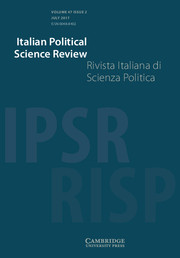
The CONGRIPS panel at APSA 2017 focuses on “Italian Politics after a Decade of Economic Recession”. It will take place on Saturday, September 2, 14:00 to 15:30 (Westin St. Francis, Hampton).
2017 will mark nearly a decade since the unleashing of the biggest economic crisis the western world has experienced since the 1930s. No country has been immune from this crisis, and Italy in particular has found itself, for lengthy periods, at the forefront of one important regional reflection of that worldwide recession, the Eurozone crisis. Unlike the previous decade, since 2008 the economic recession has provided not just an essential backdrop or context to the changes that have occurred in the Italian polity but the prime motivating factor. The economic downturn in 2008 brought to the fore – although not immediately – the deep-rooted structural problems in the Italian polity and exposed them in a dramatic manner, visibly placing a country which had long aspired to be seen alongside its more modern northern counterparts as clearly part of ‘southern’ Europe. The impact on Italian politics and the political economy, the challenges to the legitimacy of the established political parties and elites as well as the responses of those elites, has been nothing short of dramatic. Nearly a decade on, it is clear that the crisis has left a lasting impact on the Italian polity, despite the persistence of many features. This panel hosts papers by Italian specialists who analyse different aspects of the Italian polity (politics, policy, society, transition) in this decade of economic recession, assessing and explaining the degree of change that has been experienced, as well as future likely directions.
The panel will comprise four papers by: Adele Lebano (University of Edinburgh); Laura Polverari (University of Strathclyde); Manuela Caiani (SNS Florence) and Paolo R. Graziano (University of Padua); and Martin Bull (University of Salford). More details can be found here.
The Business Meeting will take place on Friday, 1 September, 18:30-19:30 (Hilton Union Square, Executive Conf. Ctr. Seacliff Room).
All welcome. The agenda will comprise: Membership, budget and Executive Committee update; 2018 Call for papers; Expansion of base, collaboration with other societies; IPSR news; Website and social media; New President’s statement; AOB.



 Referendum on Renzi: The 2016 Vote on the Italian Constitutional Revision
Referendum on Renzi: The 2016 Vote on the Italian Constitutional Revision Personalization of politics between television and the internet: leader effects in the 2013 Italian parliamentary election
Personalization of politics between television and the internet: leader effects in the 2013 Italian parliamentary election

 The University of Urbino is launching a new interdisciplinary Ph.D. Programme in Global Studies, at the crossroads of Economics, Business, Sociology, Political Science and Law. The Programme has a high quality faculty, including outstanding guests lecturers from major international universities.
The University of Urbino is launching a new interdisciplinary Ph.D. Programme in Global Studies, at the crossroads of Economics, Business, Sociology, Political Science and Law. The Programme has a high quality faculty, including outstanding guests lecturers from major international universities.